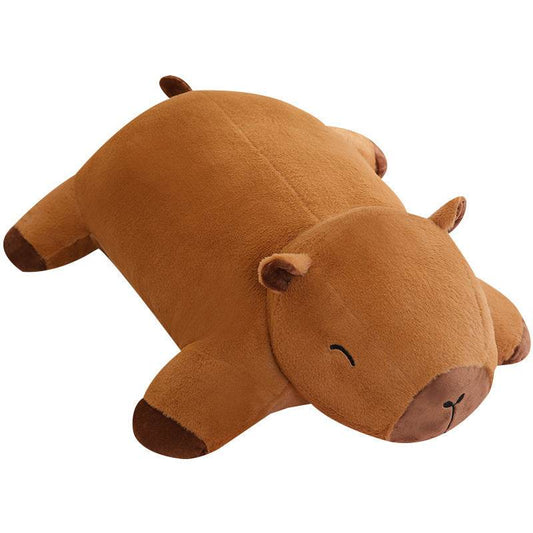In today's fast-paced world, finding comfort and solace amidst the chaos can be a challenge. That's where emotional support stuffed animals come in. These adorable companions have become more than just cuddly toys; they have become a source of comfort, a listening ear, and a constant reminder that you are not alone. But what is the science behind their remarkable ability to boost our mood and reduce stress? It turns out that it's not just their soft fur and endearing faces that do the trick. Emotional support stuffed animals tap into the power of touch, providing a tactile experience that releases feel-good hormones like oxytocin and dopamine. Additionally, their presence can help alleviate anxiety by offering a sense of security and companionship. So, whether you're struggling with a hectic schedule, dealing with a tough day, or simply in need of some emotional support, these stuffed animals offer a scientifically proven way to find comfort and relief. Join us as we explore the fascinating science behind emotional support stuffed animals and discover the transformative effects they can have on our well-being.
The Connection Between Emotions and Stuffed Animals
Stuffed animals have long been associated with comfort and emotional support. From childhood teddy bears to adult collector's items, these plush toys hold a special place in our hearts. But what is it about stuffed animals that makes us feel so connected to them? The answer lies in the emotional bond we form with these companions. When we hold a stuffed animal, touch its soft fur, and cuddle it close, our brains interpret these actions as signs of comfort and security. This triggers the release of oxytocin, often referred to as the "love hormone," which promotes feelings of trust, bonding, and relaxation. As a result, our stress levels decrease, and we experience a sense of calm and well-being. The emotional connection we have with our stuffed animals can be so strong that they become a source of support during times of distress or anxiety. They serve as a non-judgmental listener, a confidant who is always there to lend an ear and provide comfort. This connection between emotions and stuffed animals is a fundamental aspect of their ability to boost our mood and reduce stress.
The Science Behind How Stuffed Animals Boost Mood
The science behind how stuffed animals boost our mood lies in the power of touch. When we touch a soft and cuddly stuffed animal, our bodies release a cascade of positive neurochemicals. Oxytocin, known as the "cuddle hormone," is released, promoting feelings of love, trust, and happiness. Dopamine, another feel-good neurotransmitter, is also released, creating a sense of pleasure and reward. These hormones work together to elevate our mood and create a sense of well-being. The act of hugging a stuffed animal stimulates pressure receptors in our skin, which send signals to our brain to release endorphins, natural painkillers that promote relaxation and reduce stress. This tactile experience helps us feel grounded, secure, and comforted, even in the midst of life's challenges. The science behind how stuffed animals boost our mood is a testament to the power of touch and its profound impact on our emotional well-being.
The role of Stuffed Animals in Reducing Stress and Anxiety
Stress and anxiety have become all too common in our modern lives. The demands of work, relationships, and daily responsibilities can leave us feeling overwhelmed and emotionally drained. Fortunately, stuffed animals can play a significant role in reducing stress and anxiety. Their comforting presence can provide a sense of security and tranquilly, offering a safe space where we can find solace and peace. The act of holding a stuffed animal can evoke a sense of familiarity and nostalgia, reminding us of simpler times and happier memories. This connection to positive experiences helps counteract the effects of stress and anxiety, promoting a sense of calm and relaxation. Additionally, the soft and tactile nature of stuffed animals provides a soothing sensory experience that can help redirect our focus from negative thoughts to a more positive and comforting sensation. Whether it's squeezing a plush toy during a stressful moment or cuddling up with a favourite companion before bed, the role of stuffed animals in reducing stress and anxiety should not be underestimated.
The Benefits of Emotional Support Stuffed Animals for Different Age Groups
Emotional support stuffed animals are not limited to a specific age group; they can benefit individuals of all ages. In children, these cuddly companions can provide a sense of security and help with emotional regulation. Children often form strong attachments to their stuffed animals, using them as a source of comfort during times of separation or distress. These companions can also serve as a tool for building empathy and social skills, as children often project their own emotions onto their stuffed animals, practising nurturing and caring behaviours. For teenagers and young adults, emotional support stuffed animals can offer a sense of companionship and comfort during transitional periods or moments of uncertainty. They can serve as a listening ear, a confidant, and a constant source of support. In older adults, these stuffed animals can help combat feelings of loneliness and isolation, providing a sense of connection and purpose. The benefits of emotional support stuffed animals are not limited to a specific age group; they offer comfort, companionship, and emotional well-being to individuals of all ages.
Using Stuffed Animals as a Therapeutic Tool
The therapeutic benefits of stuffed animals extend beyond their role as comfort objects; they can also be used as a valuable therapeutic tool. Stuffed animals are often utilised in various forms of therapy, such as play therapy and animal-assisted therapy. In play therapy, children use stuffed animals to express their emotions, act out scenarios, and explore their inner world. This form of therapy allows children to communicate and process their feelings in a safe and non-threatening environment. Animal-assisted therapy involves the use of trained animals, including stuffed animals, to facilitate emotional healing and improve well-being. These therapeutic interventions can help individuals of all ages overcome trauma, reduce anxiety, and develop coping mechanisms. The versatility of stuffed animals as a therapeutic tool highlights their profound impact on our emotional and psychological well-being.
How to Choose the Right Emotional Support Stuffed Animal
When it comes to choosing the right emotional support stuffed animal, there are a few factors to consider. First and foremost, select a stuffed animal that resonates with you on an emotional level. Whether it's a specific animal, a particular color, or a unique design, choose something that brings you joy and comfort. Consider the size and texture of the stuffed animal, as these factors can influence the tactile experience and level of comfort it provides. If you're using the stuffed animal for therapeutic purposes, consult with a therapist or counsellor who can guide you in selecting an appropriate companion. Lastly, trust your instincts and listen to your intuition when choosing the right emotional support stuffed animal. Remember, this companion will be there for you during moments of vulnerability, offering support and comfort when you need it most.
Tips for Incorporating Stuffed Animals into Your Self-Care Routine
Incorporating stuffed animals into your self-care routine can enhance your well-being and provide a much-needed sense of comfort. Here are a few tips to help you make the most of your emotional support stuffed animals:
- Create a designated space for your stuffed animals. Set up a cozy corner or a special shelf where you can display your companions. This space will serve as a visual reminder of the comfort and support they provide.
- Practise mindfulness with your stuffed animal. Take a few moments each day to sit with your stuffed animal, focusing on the present moment. Pay attention to the sensations of touch, the softness of the fur, and the comfort it brings. Use this time to relax, reflect, and recharge.
- Use your stuffed animal for deep breathing exercises. Deep breathing is a powerful relaxation technique that can help reduce stress and anxiety. Hold your stuffed animal close to your chest and take slow, deep breaths in and out, focusing on the rise and fall of your chest. Allow your stuffed animal to be a calming presence during this practise.
- Write or draw your feelings with your stuffed animal: Use your stuffed animal as a creative outlet to express your emotions. Write in a journal or draw pictures with your companion by your side. This process can help you gain clarity, process your feelings, and find comfort in the act of self-expression.
- Share your stuffed animal with loved ones. Stuffed animals have a way of bringing people together. Share the comfort and joy of your emotional support stuffed animal with loved ones, whether it's by gifting them a similar companion or simply sharing stories and memories. This act of connection can deepen your relationships and create a sense of community.
Incorporating stuffed animals into your self-care routine can be a simple yet powerful way to prioritise your emotional well-being. By embracing the comfort and support they offer, you can find solace and relief in even the most challenging times.
Conclusion: The Power of Emotional Support Stuffed Animals in Promoting Emotional Well-Being
Emotional support stuffed animals have a remarkable ability to boost our mood and reduce stress. Through their soft fur, endearing faces, and comforting presence, they tap into the power of touch and the release of feel-good hormones like oxytocin and dopamine. Their role in reducing stress and anxiety cannot be understated, as they offer a sense of security, companionship, and solace. Emotional support stuffed animals benefit individuals of all ages, from children seeking comfort to adults in need of a listening ear. They can serve as therapeutic tools, helping individuals overcome trauma and develop coping mechanisms. Choosing the right emotional support stuffed animal involves considering personal preferences and consulting with professionals if needed. By incorporating stuffed animals into our self-care routines, we can enhance our well-being and find comfort in their presence. Personal stories and testimonials further illustrate the profound impact these companions have on our emotional well-being. In conclusion, emotional support stuffed animals offer a scientifically proven way to find comfort, relief, and emotional well-being in today's fast-paced world.

















1 comment
I can’t believe I found an article on this! My people! I am looking for friends…